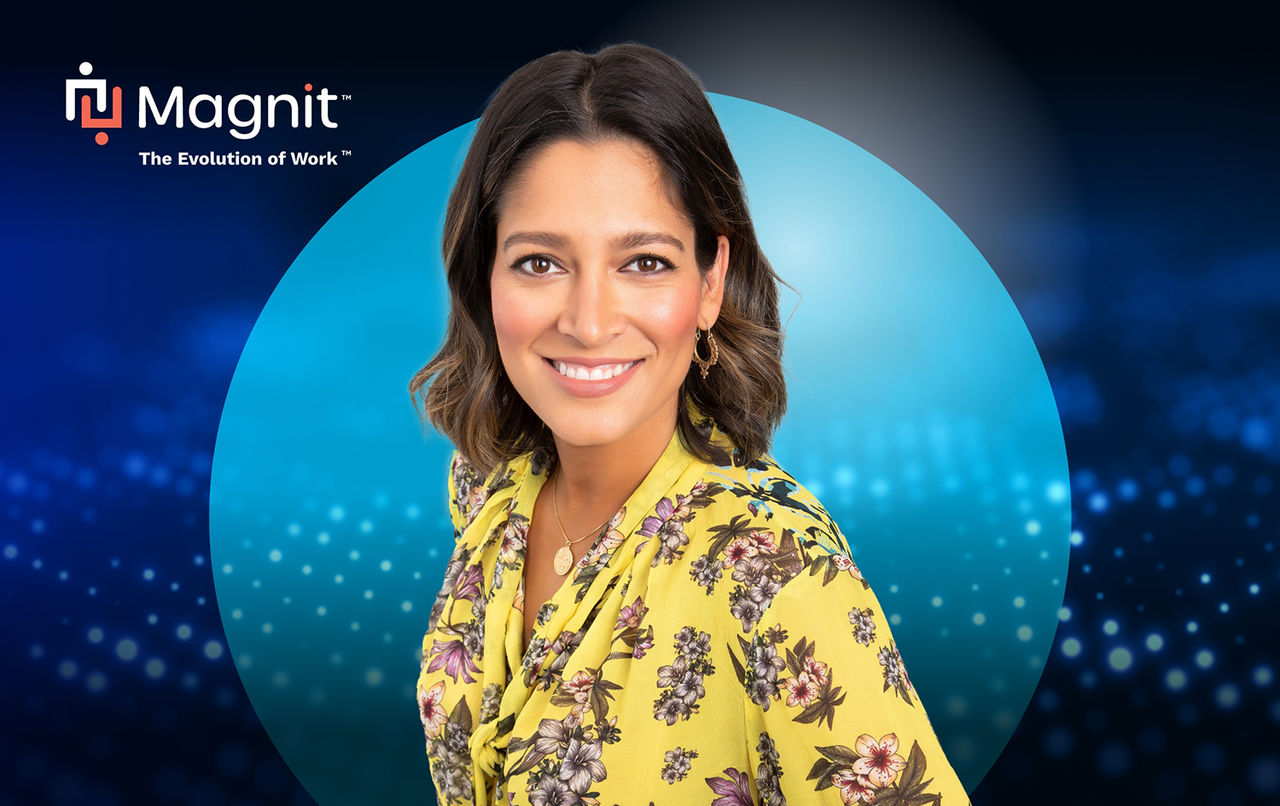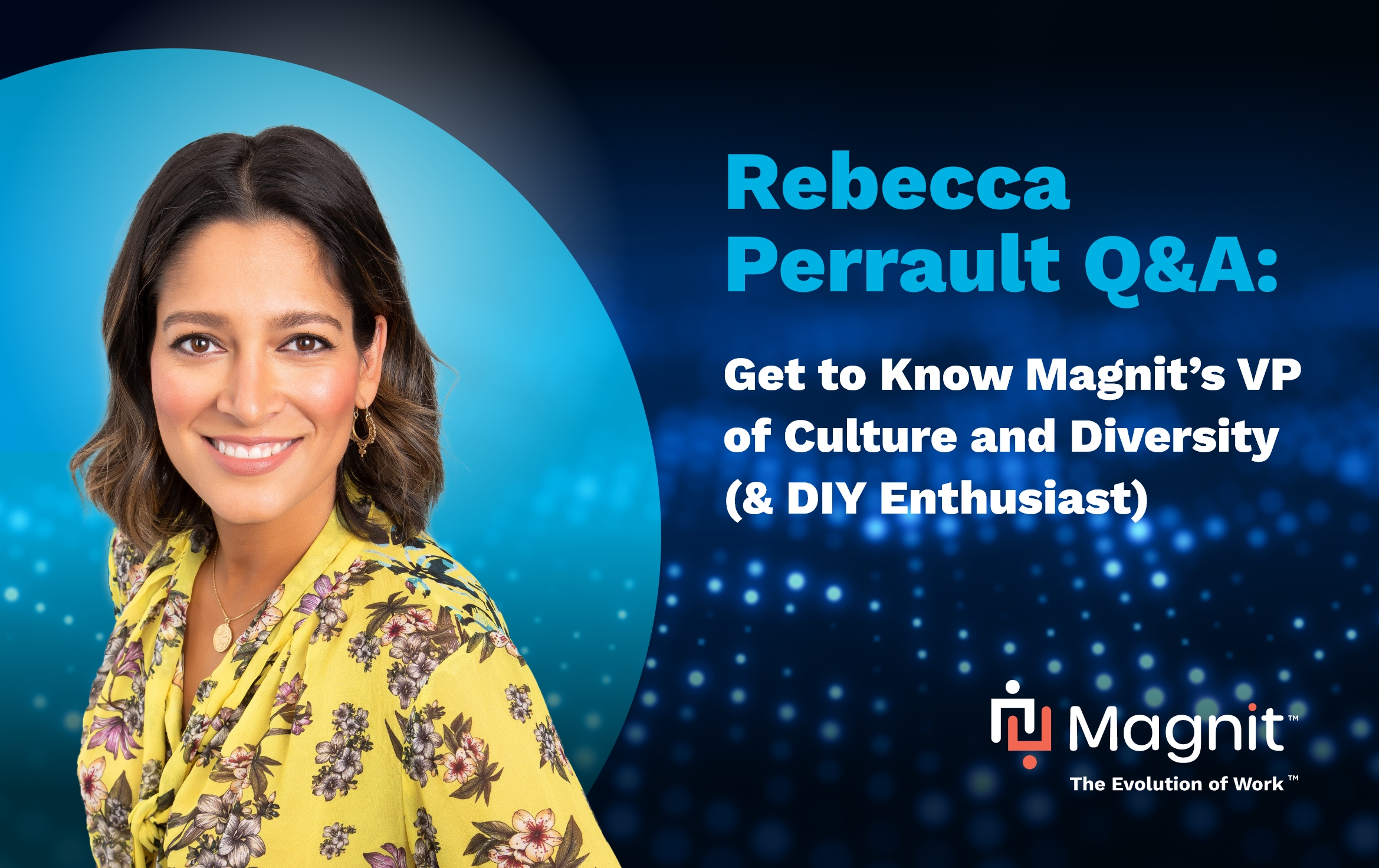VP of Culture and Diversity Rebecca Perrault on DE&I, the Definition of Success and Home Improvement Projects
Magnit August 31 2023

As part of our monthly interview series with Magnit leaders, we recently chatted with Magnit VP of Culture and Diversity Rebecca Perrault about her professional background, how she measures success in her role, her personal hobbies and more:
Tell us about your background.
I grew up in Anchorage, Alaska and I lived there my whole childhood. I’m a city girl, but if you grew up in Alaska you can't help but deal with lots of snow, bears and moose in your backyard, hunting, fishing, that kind of stuff. I left when I was 18 for college, went back a couple of summers and worked at Princess Tour Line. Then I left to the Pacific Northwest and all around the West Coast of the United States.
Describe your career path and how you got to Magnit.
My career path has taken some turns over the course of the last 20 years. I started off in consulting, I did human capital work, mergers, acquisitions, and succession planning. Eventually I reached a point in my career where I thought I needed something different, and I wanted to explore unconscious bias and the research that was involved in the diversity and inclusion space. After I delved into that, I started doing consulting work for a small niche firm where I worked on diversity and inclusion with a lot of organizations. And that led me to Magnit and wanting to do this work for a company that I was a part of. That way I could be a part of that culture, changing the look and feel working on diversity and inclusion within an organization.
What did you want to become as a child?
There were many things I thought I wanted to do. I wanted to be a librarian for a long time because I love to read. And that is a really great transition to what I do now because there is so much research involved. There's reading and understanding and learning from different people's perspectives. I didn't think it sounded like the most exciting thing, but it encompassed what I loved to do.
What personal experience has shaped your leadership style?
I think leadership is really shaped by multiple dimensions. You get shaped by wonderful leaders that you're surrounded by, but also the leaders that maybe aren't so great. Especially during my time in consulting, I had some amazing leaders that I worked with that were very engaged and cared about their people, but were also very motivating and pushed you forward. That balance can be hard to achieve, but I'm always striving to do that. There is a personal side and a connection with your people and with the organization. There's also a desire to push past what you think you're capable of doing so you grow and learn. There have also been some leaders that I worked with that were not as interested in the personal side and thought, “Let's just get the work done.” And I don't think I want to emulate that.
I think it's very important to think about the individuals and what they need to be successful; that's what helps the whole. That's what you think about when you are looking at diversity, equity and inclusion - that not everyone needs the same thing to be successful and to thrive at work. And work is so much a part of our lives. We need that balance between our personal and our professional lives. But if we're not enjoying ourselves professionally and if we're not pushed forward, that's a that's a detriment to our lives. So it's really important to me to give people what they need to be successful; that is what we should all be striving to do as leaders in an organization so that we can collectively succeed.
How do you measure success in your role?
Success in my role is about enabling other people because that’s the definition of a diversity, equity and inclusion leader and a culture leader within an organization. It’s about creating an environment where the whole organization can thrive, and that means reaching people who might be the most marginalized. And as you pull them up and magnify their voice, it becomes better for everyone. For example, if you think about different parental leaves, those support same sex couples and the LGBTQ+ community, but they also support traditional relationships and marriages so that men can take time off when their children are born. So policies and changes like that really help everyone in an organization, but you're addressing the needs of some of the potentially most marginalized to create those policies.
So when I think about success in my role, it is about enabling it. I do this work because I want to impact people's lives. It’s about getting that voice out there for me to be influential to other leaders in changing minds or opening minds. And that might feel scary to a lot of people.
Success in my role is when I get a note saying, “Hey, you made me think about this. I was talking with friends and family about our conversation earlier about the training you did or the workshop that you held.” That's really what success for me is.
What is a fun fact about you?
I have three little boys that run around and keep me very busy. I have a 12-year-old, a 7-and-a-half year-old, and an almost-5-year-old.
While they're running around, I like to do a lot of projects around the house. Sometimes you'll see me getting into trouble with my miter saw and my safety glasses on. My philosophy when it comes to work and at home is that I can figure it out, so I’m often making a mess and getting into trouble trying to figure things out myself. But it has almost always worked out. I built a bench for my Octagon greenhouse last year, so my hobby at home is building cabinets and things like that.
Tell us about Magnit’s recent ESG report and what’s coming in the future.
The Environmental Social Governance (ESG) report is really exciting because it was a priority from the board all the way to our leadership team. The environmental side of it has been a personal interest of mine, but to be able to learn about it professionally and learn from the expert on my team is very exciting. But our stance was really putting the social aspect of it first.
Even though it's sandwiched in ESG, that social piece is what we can impact. Our CEO, Teresa Carroll, has been talking about the hundreds and thousands of people that we support by putting them to work through our programs. And that social piece of ESG is where we can make a really big difference, so DE&I fits in there.
We've made commitments and have told people where we are, so it's very transparent. One of the things that I really worked on was to share as much information as we could. Some information we didn't have as fully as we wanted, but we're going to continue to share where we are and make commitments for the future. (Learn more about the report in our blog)
We were very new on our journey for the environmental side, but we are really trying to push the industry forward, and people have probably heard me say that for our DE&I for the contingent workforce too. We're going to continue to do that in all these areas, adding new requirements as needed, whether that's a Net Zero goal for our carbon emissions, sharing and disclosing diversity data and creating goals, including for our LGBTQ+ communities, our race and ethnicity representation, our female representation, etc.. We aim to push ourselves as well as everyone around us that might use us as a benchmark forward on this journey because DE&I doesn't happen overnight. It is something that needs to be embedded in our culture, a lens that every leader uses, and every employee uses in our interactions - so this is a part of that journey.
For more information about Magnit and our approach to innovation, visit our “Leadership” and “About Magnit” pages.
Disclaimer: The content in this blog post is for informational purposes only and cannot be construed as specific legal advice or as a substitute for legal advice. The blog post reflects the opinion of Magnit and is not to be construed as legal solutions and positions. Contact an attorney for specific advice and guidance for specific issues or questions.

